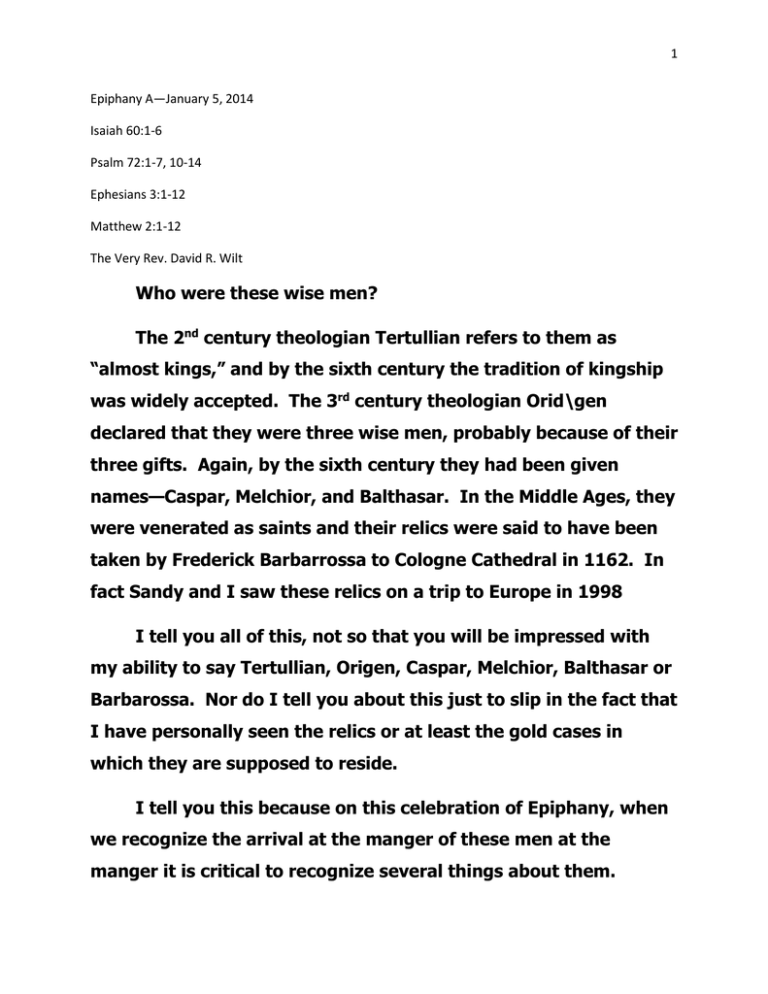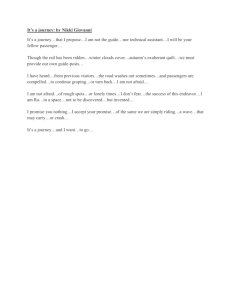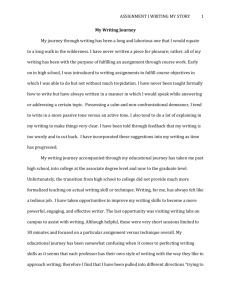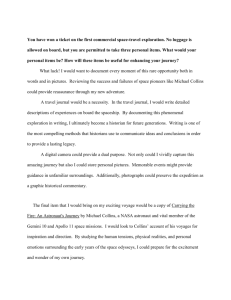
1
Epiphany A—January 5, 2014
Isaiah 60:1-6
Psalm 72:1-7, 10-14
Ephesians 3:1-12
Matthew 2:1-12
The Very Rev. David R. Wilt
Who were these wise men?
The 2nd century theologian Tertullian refers to them as
“almost kings,” and by the sixth century the tradition of kingship
was widely accepted. The 3rd century theologian Orid\gen
declared that they were three wise men, probably because of their
three gifts. Again, by the sixth century they had been given
names—Caspar, Melchior, and Balthasar. In the Middle Ages, they
were venerated as saints and their relics were said to have been
taken by Frederick Barbarrossa to Cologne Cathedral in 1162. In
fact Sandy and I saw these relics on a trip to Europe in 1998
I tell you all of this, not so that you will be impressed with
my ability to say Tertullian, Origen, Caspar, Melchior, Balthasar or
Barbarossa. Nor do I tell you about this just to slip in the fact that
I have personally seen the relics or at least the gold cases in
which they are supposed to reside.
I tell you this because on this celebration of Epiphany, when
we recognize the arrival at the manger of these men at the
manger it is critical to recognize several things about them.
2
These were individuals of importance, probably receiving great
respect in their own countries. To this point we have only focused
on the marginalized shephards who were told to go visit this
manger scene by an Angel. No Angels have encouraged the magi
but none the less they have been given a sign. A sign that they
will find beneath this star something worth traveling to see.
Being from the East these men are symbolically expanding the
importance of Jesus’ birth from Jewish to worldwide. Also, these
would have likely been not only people of stature but also of
means.
What is next important about these three, (we will go with
3) is how they came to approach the child in the manger. Their
gifts were not to impress or gain favor, which is often the reason
we give gifts. The scripture is very specific, “On entering the
house, they saw the child with Mary his mother: and they knelt
down and paid him homage.” Then and only then did they open
their chests and give him gifts.
Homage first, gifts second.
That’s a very important order of things. Gifts were offered
only after they had established the order of this relationship.
Christ first then gratitude.
3
Contrast this with Herod’s ironic comment earlier in the
scripture, “when you have found him, bring me word so that I
may also go and pay him homage”
In this case Herod has no intention of worshipping anything
other than the powers that exist already. He offered false piety to
these wise men to enhance his own power and position.
So how they greeted this child is most important. Homage,
then gifts of gratitude.
Finally we see in the mirror how this journey effected the
lives of these Wise Men. T.S. Eliot expresses this in a poem titled,
“The Journey of the Magi”
'A cold coming we had of it,
Just the worst time of the year
For a journey, and such a long journey:
The ways deep and the weather sharp,
The very dead of winter.'
And the camels galled, sorefooted, refractory,
Lying down in the melting snow.
There were times we regretted
The summer palaces on slopes, the terraces,
And the silken girls bringing sherbet.
Then the camel men cursing and grumbling
and running away, and wanting their liquor and women,
And the night-fires going out, and the lack of shelters,
And the cities hostile and the towns unfriendly
And the villages dirty and charging high prices:
A hard time we had of it.
At the end we preferred to travel all night,
Sleeping in snatches,
With the voices singing in our ears, saying
4
That this was all folly.
Then at dawn we came down to a temperate valley,
Wet, below the snow line, smelling of vegetation;
With a running stream and a water-mill beating the darkness,
And three trees on the low sky,
And an old white horse galloped away in the meadow.
Then we came to a tavern with vine-leaves over the lintel,
Six hands at an open door dicing for pieces of silver,
And feet kicking the empty wine-skins.
But there was no information, and so we continued
And arriving at evening, not a moment too soon
Finding the place; it was (you might say) satisfactory.
All this was a long time ago, I remember,
And I would do it again, but set down
This set down
This: were we led all that way for
Birth or Death? There was a Birth, certainly
We had evidence and no doubt. I had seen birth and death,
But had thought they were different; this Birth was
Hard and bitter agony for us, like Death, our death.
We returned to our places, these Kingdoms,
But no longer at ease here, in the old dispensation,
With an alien people clutching their gods.
I should be glad of another death.
© T S Eliot. All rights reserved
Remember that Eliot has the advantage of the passage of
time, but for each or any of us the decision to make the journey to
the manger involves the decision to persevere through whatever
conditions would hinder our journey.
5
There is always that temptation to go back to the old ways.
Those we depend upon to help us on the journey may not even
have the same agenda
But, by persevering there comes a time when we notice a
change. Described in the poem as a climate change, new growth,
as Eliot puts it “a temperate valley, wet, below the snow line,
smelling of vegetation,” an image symbolic of new life, new
growtt, and a hope of salvation.
Then only to be met by the townspeople who are surrounded
by this glorious event who remain in oblivion. Hints of the
preoccupation of life, the illusion to the lintel and the Passover,
but shrouded by the treachery of the luring pieces of silver.
“Finding the place; it was (you may say) satisfactory.”
Only satisfactory? Does this not remind you of packed
churches on Christmas Eve and thereafter empty?
Then, finally having made the journey and returning to our
familiar surroundings we all must reflect on what we really found
and what we are going to do with it.
The Magi reflects, yes, he would do it again but for what?
Birth or Death?
Certainly he had seen the birth, We have seen the birth. But
does it end there?
6
We return to our places, our Kingdoms but are we at ease
there? We find ourselves surrounded by the same old gods-money, jobs, obsessions.
Then the poem ends with the eerie statement, “I should be
glad of another death.”
Was he talking about himself, now faced with having
witnessed the birth of Christ but not able to break the bonds that
society holds us in.
Was he talking about dying to his old life and looking
forward to the promise that witnessing the birth of this child now
offers, an alternative to the gods we have been programed to
worship.
Or, was he talking about the fact that the birth was
necessary for the life to be lived so that the crucifiction and
resurrection could change all of our lives.
The light has come into the world but, like the Magi, having
found that light our journey is not over, it has only just begun.
And, in the end each of us must make our choices of what that
light means to us. What that birth means to us. What that life
means to us. What that death means to us.
7






